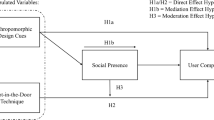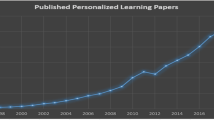Abstract
In the Internet of Things (IoT) and Machine to Machine (M2M) environments, users seek a wide variety of services on their own mobile devices with limited resources, such as mobile phones and smart watches. Resource collaboration effectively addresses the concern of restricted resources. In our previous study, we employed reasoning time to recommend resources in our resource collaboration system. We found reasoning time increases exponentially depending on the number of resources and rules for filtering resources. To reduce reasoning time and improve the user satisfaction consequent to reasoning, this current research adopts and applies the Dominance, Inducement, Submission, and Compliance (DISC) model, a popular method in the psychological field for classifying characteristics on the basis of behavior patterns. By implementing and evaluating a prototype system, this paper shows the proposed method is a reasonable solution for resource recommendation.









Similar content being viewed by others
References
Abayomi M, Otebolaku MTA (2015) Context-aware media recommendations for smart devices. J Ambient Intell Humaniz Comput 6(1):13–36
Albrecht S (2010) Ubiquitous computing: are we there yet? Computer 43(2):95–97
Huang CM, Lin SY, Hsieh TH (2015) The personalized context-aware mobile advertisement system using a novel approaching detection method over cellular networks. Softw Pract Exp 45(1):31–52
JENA2 (2010) A Semantic Web Framework. http://jena.sourceforge.net
JESS (2010) The Rule Engine for the JavaTM Platform. http://herzberg.ca.sandia.gov/jess/
Kevin H, William H (2002) selling yourself to others: the new psychology of sales. Pelican Publishing, Gretna
Krzywicki A, Wobcke W, Kim YS, Cai X, Bain M, Mahidadia A, Compton P (2015) Collaborative filtering for people-to-people recommendation in online dating: data analysis and user trial. Int J Hum Comput Stud 76:50–66
Lee SE, Jeong YM, Shin DK, Oh WS, Choi JC (2005) Embedded wireless LAN base-band processor for ubiquitous computing systems. In: Proceeding of international conference on consumer electronics 2005, pp 321–322
McFaddin S, Coffman D, Han JH, Jang HK, Kim JH, Lee JK, Lee MC, Moon YS, Narayanaswami C, Paik YS, Park JW, Soroker D (2007) Celadon: delivering business services to mobile users in public spaces. IBM Research Report RC24381(W0710-101)
Mojtaba S (2013) An effective recommendation based on user behaviour: a hybrid of sequential pattern of user and attributes of product. Int J Bus Inf Syst 14(4):480–496
Park JH, Kang JH (2010) Resource collaboration system based on dynamic user preference and context. Artif Intell Rev 34(3):271–287
Park WI, Kang SG, Kim YK (2012) A personalized multimedia contents recommendation using a psychological model. Comput Sci Inform Syst 9(1):1–21
RDF Primer (2004) Recommendation W3C. http://www.w3.org/TR/2004/REC-rdf-primer-20040210
Renbin X, Tongyang Y (2013) A multi-agent simulation approach to rumor spread in virtual commnunity based on social network. Intell Autom Soft Comput 17(7):859–869
Richard B, Zeynep GC, Joseph P (2002) The social psychology of consumer behaviour (applying social psychology). Open University Press, Maidenhead
SPARQL (2013) 1.1 Query Language, W3C Recommendation. http://www.w3.org/TR/2013/REC-sparql11-query-20130321/
Wan T, Tao L (2017) Building ontology for different emotional contexts and multilingual environment in opinion mining. Intell Autom Soft Comput, 1–7
William MM (2014) Emotions of normal people. Cooper Press, London
Wu SH, Chiang RD, Chang HC (2018) Applying sentiment analysis in social web for smart decision support marketing. J Ambient Intell Humaniz Comput 9:1–10
Xiwang Y, Yang G, Yong L, Harald S (2014) A survey of collaborative filtering based social recommender systems. Comput Commun 41:1–10
Zeng Z (2012) Research on context-aware information recommendation service for the Ubiquitious web. J Comput Inf Syst 8(9):3715–3722
Acknowledgements
This work was supported by the National Research Foundation of Korea (NRF) grant funded by the Korea government (MSIT) (No. 2018R1A2B6008965).
Author information
Authors and Affiliations
Corresponding author
Additional information
Publisher’s Note
Springer Nature remains neutral with regard to jurisdictional claims in published maps and institutional affiliations.
Rights and permissions
About this article
Cite this article
Park, JH. Resource collaboration system based on user history and the psychological mode. J Ambient Intell Human Comput 9, 1683–1691 (2018). https://doi.org/10.1007/s12652-018-0807-2
Received:
Accepted:
Published:
Issue Date:
DOI: https://doi.org/10.1007/s12652-018-0807-2




